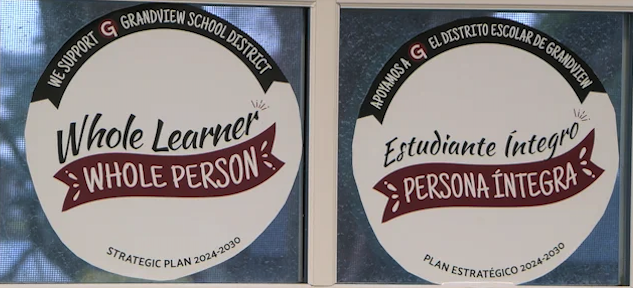
College of Arts and Humanities
VII. Mentorship of New and Tenure-Track Faculty
Objectives
Mentoring arrangements are designed to provide support, assistance, and academic and departmental acculturation for all tenure-track full-time faculty. Mentors offer advice through the probationary period and address questions and concerns in a confidential manner. Ultimately, mentors should provide tools to help new faculty achieve success at CWU.
Mentoring new faculty in the College of Arts and Humanities
Mentoring in our college connects junior faculty with senior colleagues who have achieved tenure in the same department (when possible). Each partnership works together to help the junior member set priorities, develop a network of advisors, increase visibility in the university and professional communities, and understand Central's institutional culture, and tenure process.
This is a structured mentoring program: members of each partnership are expected to commit to regular meetings and formulate goals in different areas appropriate for the junior faculty member. Even with an overall structure in place, the program affords each partnership great flexibility in choosing how to spend their time and energy to enhance the junior members' careers. Partners meet throughout the academic year to work toward goals they develop together. Every success recorded by a mentoring participant is part of building a better future for all faculty at Central.
Guidelines
Department responsibilities (personnel committee):
- Develop formal mentoring guidelines for both tenure-track and non-tenure-track faculty who are new to the department.
- Providing accountability for both mentors and mentees.
- Oversite of the mentoring program.
- Department chair responsibilities:
- Provide tenure-track faculty with guidance on policies and procedures for reviews; including detailed information about the timing of their reviews.
- Communicate how the department will support and assess tenure-track faculty members’ growth as a teacher, the development of teaching materials, and the required materials needed for their review.
- Ensure that each tenure-track faculty member is engaged in useful, meaningful service that will give them a voice in the shared governance to support the department.
- Meet with tenure-track faculty at least twice per year either individually or as a group to hear their feedback on the program and to support those faculty members.
- For non-tenure track faculty, make sure they are familiar with department/university policies, supply them with sample syllabi, and pair them with another faculty member that can serve as their mentor.
Mentors and mentees should be expected to meet on a regular basis; we suggest monthly but certainly no less than once per quarter.
The department chair should be charged with ensuring that the mentoring relationship is formalized.
Relationships should be established for the first two years of the new faculty’s appointment at a minimum. This period will get them through their second-year evaluation.
Evaluation of the relationship is recommended at the end of each quarter to be reviewed confidentially by the Chair. A simple online questionnaire might include the following questions:
- How often did you and your mentor/mentee meet?
- Do you feel that these meetings are sufficient?
- How has your mentor assisted you?
- (For mentee) What other areas of assistance do you require?
- (For Mentors) What areas of assistance do you require? Any resources or information that would help you be a better mentor?
- Mentors and departments should encourage new faculty to connect with existing resources, such as:
Required training through HR
- Faculty 180 training
- Department and College handbooks
- Department and College tenure and promotion guidelines
- Faculty development opportunities on campus
- Faculty development funds available on campus
- Canvas training
The mentoring relationship should focus on short-term issues (How do I post grades on MyCWU/Canvas? How do I deal with plagiarism or student grievance?) as well as long-term (How do I achieve tenure? How do I use the Faculty 180 in reporting my teaching, scholarship, and service? How do I articulate my research agenda? How do I achieve work-life balance?)
Mentoring that focuses on the tenure and promotion process:
- Learning Faculty 180
- Department guidelines
- Sample self-statements from past successful reviews
- Development of the curriculum CV
- Implicit expectations like observing office hours, attending faculty meetings, collaboration with colleagues, advising, etc.
Topics for monthly meetings can include:
- Review of the Collective Bargaining Agreement – Especially those sections that pertain to faculty in the probationary period of review.
- Beginning of the year – Ordering books from the bookstore, using Canvas, syllabus format, the university required syllabus statements
- End of the quarter – entering grades, dealing with plagiarism and the student conduct process, evaluating student comments.
- Department organization – divisions, committees.
- Decision-making – role junior faculty have.
- Support staff – what is expected of them.
- Conferences – travel funding? Presentations expected? Networking.
- Publishing/scholarship/creative activity – what are the expectations? Difference between A and B scholarship.
- Teaching – Expectations, required documentation, interpreting SEOI’s, innovations, peer observations, learning to use Canvas.
- Advising – Expectations, learning the requirements of the curriculum, graduate faculty, directing thesis.
- Service – Expectations? How much is too much? Best committees to serve on?
- Reviews – Schedule of reviews? What documentation is needed? Timeline of the review and who is evaluating?
- Tenure – Can I go up for early tenure? Letters of support? What is too trivial to include in my dossier? How are merit raises determined?
- Personal issues: What are the policies for family and personal leave? What support is available for the birth of a child, adoption of a child, or medical leave? Where do you go for help if involved in a controversy or dispute?
Tips for Mentors
- Exchange CV's with your mentee to stimulate discussion about career paths and possibilities.
- Ask about and encourage accomplishments. Provide constructive criticism and impromptu feedback.
- Use your knowledge and experience to help junior faculty member identify and build on his/her strengths. Try to be in contact twice monthly (if possible) about the junior faculty's career and activities. Commit to making one contact per month to show you're thinking about your mentee’s career.
- Discuss performance reviews with the junior faculty member: how to prepare, what to expect, how to deal with different outcomes. Preview the faculty 180 file and self-statement before it is submitted for department review
- Aid the junior faculty in exploring the institutional, school, and departmental culture, i.e., what is valued? What is rewarded?
- Share knowledge of important university and professional events that should be attended by the junior faculty member.
Tips for Mentees
- Show initiative in career planning: write a personal statement about your educational philosophy (to be amended as needed); exchange your CV with your mentor for discussion.
- Find out about, and take advantage of opportunities for learning about how the university, and your field, operate. Write down questions as they occur to you, and then begin searching out the answers.
- Realize that your success is important not just to you, but also to your department and the university. Consider that "going it alone" doesn't work that well for anyone.
- Make your scheduled meetings with your mentor a priority, and take advantage of email and the telephone to keep in touch informally.
- Be willing to ask for help, and to accept constructive criticism.
- Begin assembling your "advisory board" of supporters and advisors in the university community.
- Make and maintain contacts with other junior faculty, within your department as well as in other departments and schools.
- Become familiar with the resources available to support and strengthen your teaching and research.
- Assemble a library of information about your institution, college, and department: the collective bargaining agreement, college tenure and promotion guidelines, and department handbook.
- Set a meeting with your chair to discuss departmental expectations for tenure and promotion.
CWU News

$4 million federal grant aimed at helping with school psychologist shortage
February 25, 2026 by Marketing and Communications

CWU Disability Services aims to provide equitable access to education
February 23, 2026 by Rune Torgersen